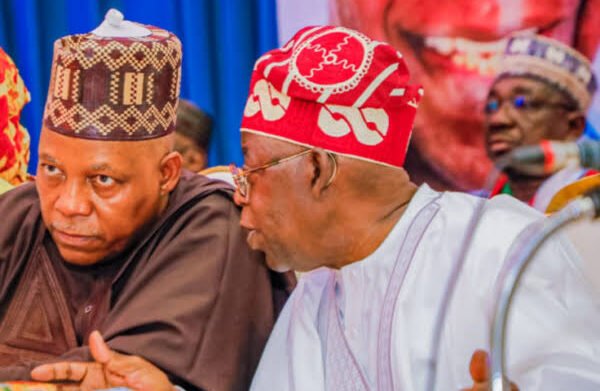THE appointment of Professor Nentawe Yilwatda Goshwe as the new National Chairman of the All Progressives Congress (APC) is already stirring political recalculations not just within the party, but across the national stage.
News Point Nigeria reports that while many saw the move as a routine succession following Abdullahi Ganduje’s resignation, political insiders describe it as a strategic recalibration with eyes firmly set on 2027.
Yilwatda’s emergence, endorsed at the APC’s 14th National Executive Committee (NEC) meeting, has shifted the party’s internal power dynamics.
It addresses a looming political and geographic imbalance that had placed Vice President Kashim Shettima, a North-Easterner, in a potentially precarious position, especially when Ali Dalori, also from the North-East, briefly served as Acting National Chairman.
That dual leadership from the same region threatened the APC’s zoning calculus, particularly in a nation where regional and religious representation is heavily scrutinized.
By selecting Yilwatda, a Christian technocrat from Plateau State in the North-Central, the APC may have deftly defused that tension and paved the way for Shettima’s political viability as Vice President come 2027.
Beyond geopolitical alignment, Yilwatda’s Christian faith brings crucial balance to a party that came under fire for fielding a Muslim-Muslim presidential ticket in 2023.
His background as the son of a reverend, coupled with deep roots in the Christian community, is seen as a strategic olive branch to Middle Belt and southern Christian voters disillusioned by the party’s previous choices.
His emergence marks a return of the APC chairmanship to the North-Central, a zone that lost the position in controversial circumstances when Senator Abdullahi Adamu was replaced by Ganduje.
The move is already being interpreted as a peace offering and a step toward rebuilding trust in a region that has increasingly wavered in its support.
For Vice President Kashim Shettima, this development is anything but ceremonial.
A source in the APC told News Point Nigeria that, ‘the restructuring enhances Shettima’s standing ahead of 2027, whether as Tinubu’s running mate again or as a potential presidential candidate, come 2031’.
“Having an ally and loyalist like Yilwatda, who coordinated APC’s 2023 campaigns in Plateau and served as one of Shettima’s northern foot soldiers, now at the helm the party offers him institutional leverage”, the source added.
“Every power bloc in Nigerian politics needs a home base within the party structure. With Yilwatda as chairman, Shettima may have just secured his,” the source stressed.
However, not all signs point to a clear runway for Shettima.
Other multiple sources told News Point Nigeria that the National Security Adviser, Nuhu Ribadu, a fellow North-Easter, is quietly being positioned by elements within the Presidency as a possible vice-presidential alternative or even presidential contender come 2031.
Though Ribadu has maintained silence, his increasing prominence and alignment with powerful political blocs have not gone unnoticed.
“There is a shadow contest brewing,” another APC insider said. “While Shettima has loyal grassroots structures, Ribadu is earning the quiet confidence of the inner circle.”
Yet, amid the power plays, Nentawe Yilwatda’s own pedigree remains impressive.
A former INEC commissioner, digital governance expert, and university professor, he brings technocratic depth to a party often criticised for recycling career politicians. His work with global institutions like the World Bank, UN, and EU bolsters his credibility.
Though he lost the Plateau 2023 governorship election, his post-election conduct—respecting the court’s final decision earned him praise as a mature democrat.
His humility and loyalty during the Tinubu-Shettima 2023 campaign have further strengthened his stock within the party.
With Atiku Abubakar, Peter Obi, and other presidential hopefuls already making quiet moves, the APC appears determined to rebuild internal cohesion, broaden its appeal, and project competence.
Observers say the party’s latest restructuring solves multiple problems at once: easing northern tensions, re-engaging the North-Central zone, addressing religious imbalances, and strengthening the vice president’s influence ahead of a potential succession race.
“Whether Tinubu runs in 2027 with Shettima or Ribadu, the APC now looks better positioned to face the electorate thanks to one strategic move,” a political analyst said.
For now, Yilwatda’s appointment may seem like a party management decision on the surface. But in Nigeria’s power chessboard, it could prove to be one of the most consequential political moves of this electoral cycle.







